
[ad_1]
Samsung’s The Frame has been one of the most unique TVs available in the market with the ability to use the TV literally as a picture frame on the wall when not in use. Since the launch of the first generation of the Frame, we have seen a number of TV manufacturers offer a variety of ambient modes including the ability to use your TV as a picture frame. But the one thing that set Samsung’s The Frame apart from the competition was its unique bezels that make the TV look like a real frame, the one connect box that makes cable management a breeze and of course, the picture quality of the TV. Today we have with us the 50-inch 2021 Frame from Samsung. Does it live up to the legacy?
Samsung The Frame 2021: Specs at a glance
Panel Size: 50-inch (available in 43, 55, 65 and 75-inch screen sizes)
Panel Type: VA
Panel Resolution: 3840 x 2160 – 4K
Panel Refresh Rate: 60Hz (55-inch and higher have a 120Hz display)
HDR 10 support: Yes
HDR 10+ support: Yes
Dolby Vision Support: No
Weight: 12.2 kgs
HDMI Ports: 4
USB Ports: 2
Bluetooth: Yes, 4.2
Wi-Fi: Yes, dual-band
Ethernet: Yes
Speakers: 20W
Built-in storage: 16GB
Price: 75,990
Samsung The Frame: Display Panel and Picture Quality
Kicking things off with the display panel, the TV has QLED backlighting and does not come with any dimming zones. Using the Calman we got sustained brightness of 350 nits but we recorded a peak brightness of slightly over 500 nits in some real-world use. But the brightness calibration when it comes to the PS5 (review) is a mystery which we will explore in later sections. In our ColorChecker analysis, we got an average delta error of 10.5 in the BT 2020 colour space in HDR which is quite impressive. While the SDR numbers in terms of delta error were higher than we’d like, this did not translate into the real-world performance of the TV. In real-world use, the TV can produce some punchy colours which we’ve experienced on Samsung TVs in the past.
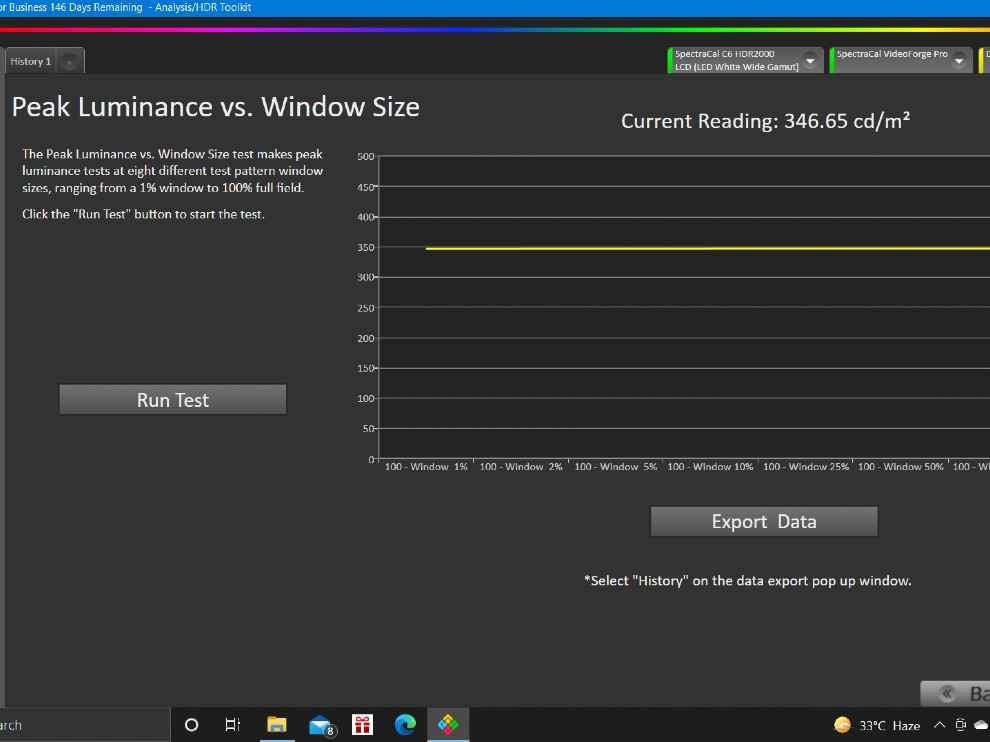
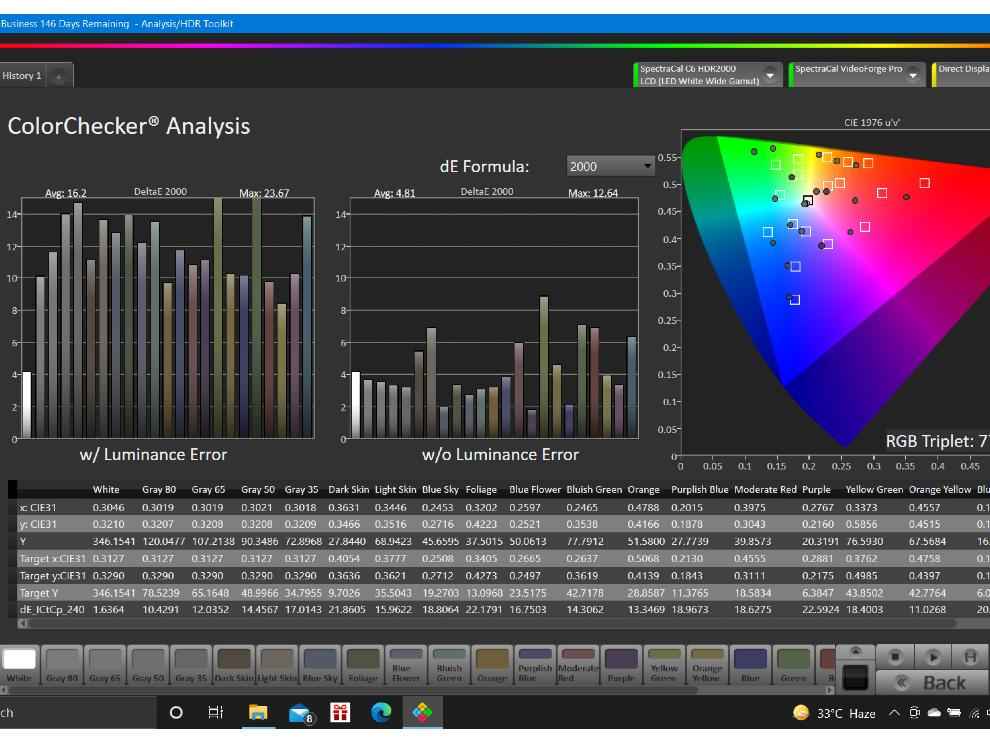
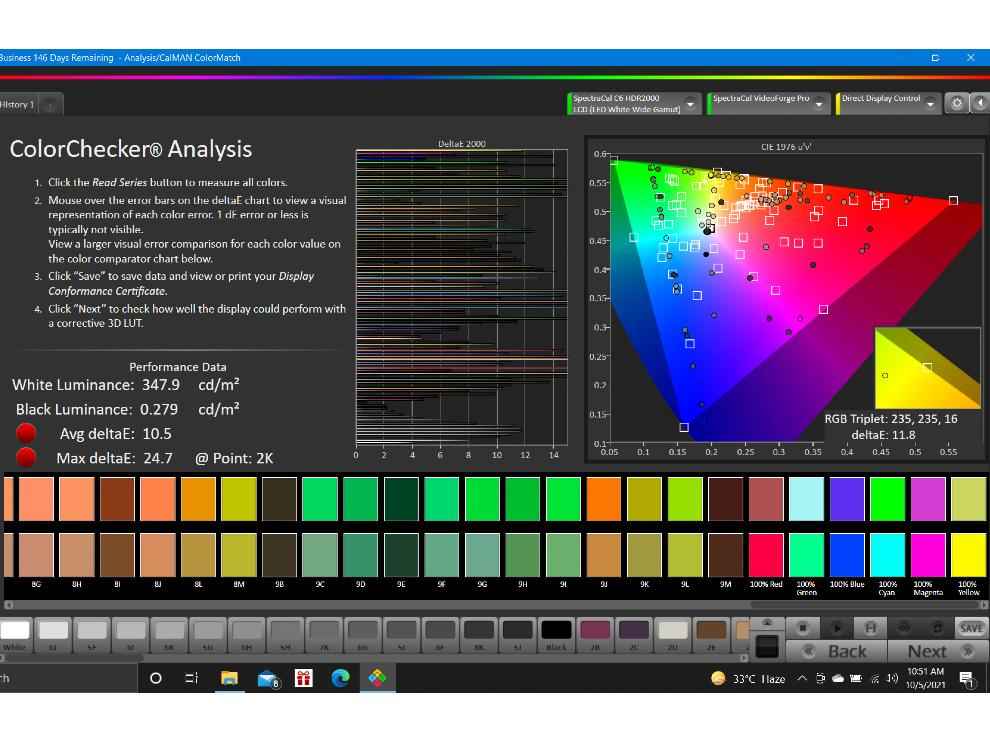
Samsung The Frame: 4K and HDR performance
Let’s get the bad news out of the way, the Frame does not support Dolby Vision. It supports HDR 10 and 10+ along with HLG. While the lack of Dolby Vision is missed, TV can produce good HDR content. In this case, it is an acceptable tradeoff rather than having a spec on paper and lack performance.
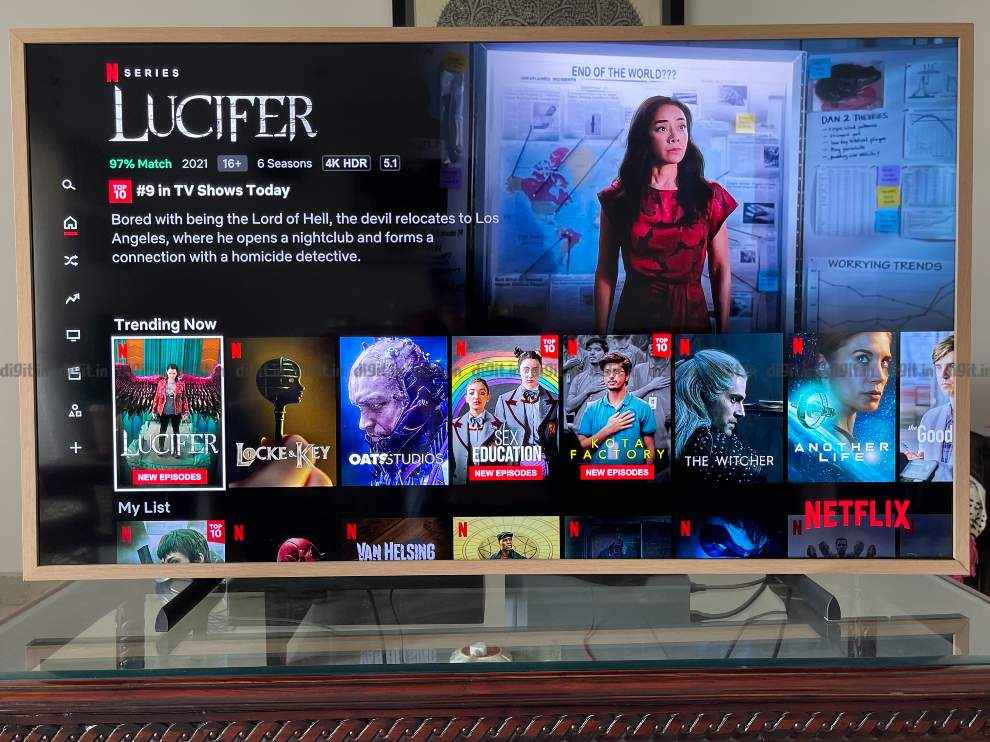
We saw our standard slew of content on the TV from streaming services like Our Planet, Altered Carbon, Jack Ryan, Grand Tour, Ready Player One and many more. The most interesting thing to note is the picture presets. While you do have the ability to switch from Standard to Movie, so on and so forth, I’d recommend keeping the “Intelligent mode” of the TV on as it does a great job of judging the content on the screen and changing the settings accordingly. The only recommendation I’ll make is to go into the ‘Expert Settings’ and switching ‘Picture Clarity Settings’ off to turn off motion smoothing.
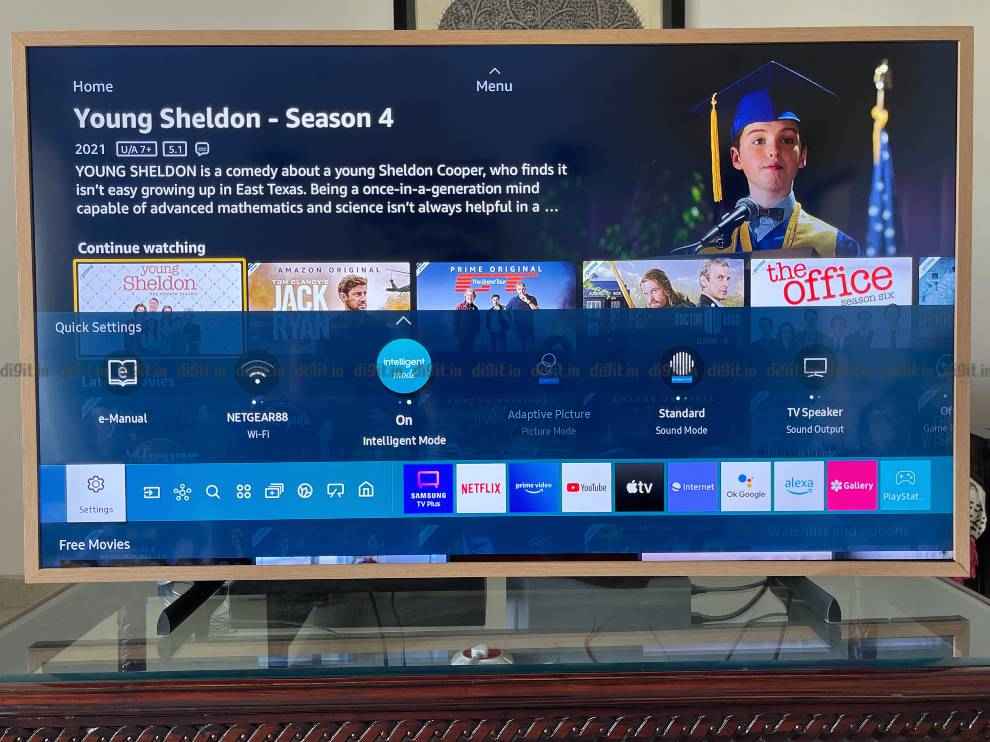
For HDR content, the intelligent mode brings about warm tones when needed and skin tones look natural. While the TV isn’t the brightest, we’ve seen, it isn’t dull by any means, retaining a good amount of highlights in HDR content. You’ll only know what you are missing if you know where to look. If I had to describe the colours on this TV in one word it would be punchy and that shows when you consume HDR content.
Samsung The Frame: SDR performance
We played a lot of content on this TV in SDR and Samsung has done something very right with its “intelligent mode” picture setting. When watching animated content, the colours look very vibrant. Even in a movie like Spider-Man: Homecoming, the reds and blues in Spider-Man’s suit are very well accentuated while the skin tones and other colours are natural without exhibiting any unnatural vividness. Sure, you can play around with the settings yourself. For example, the Movie preset works well, just remember to change the colour temperature to Warm 2 and bump up the backlighting to full.
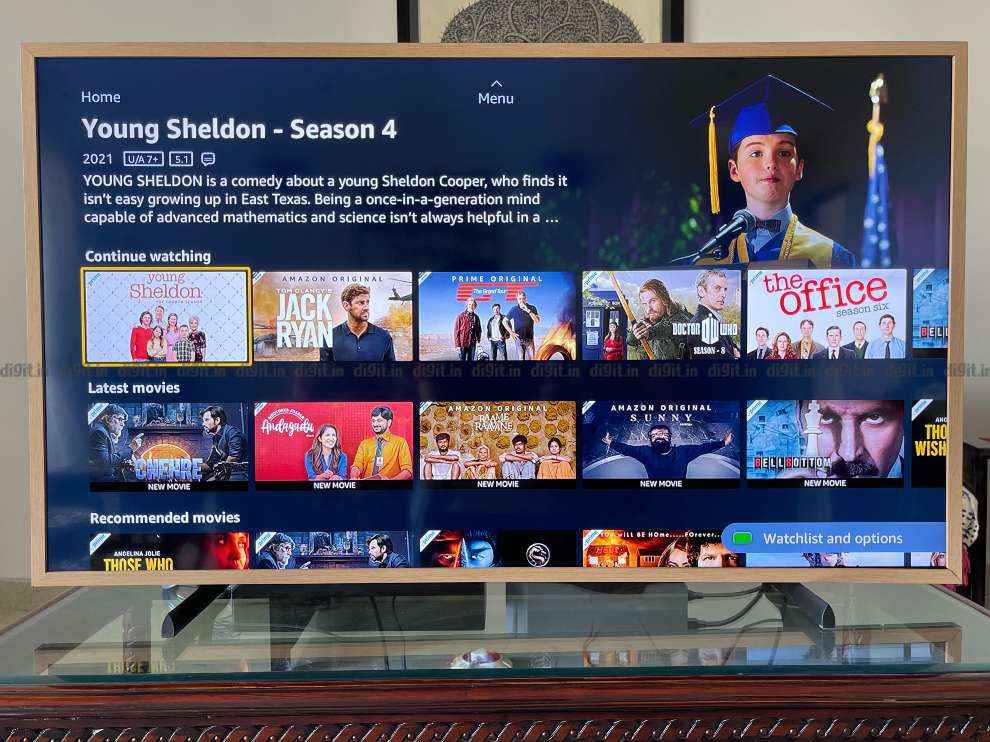
Even in a show like Young Sheldon, skin tones look good without overexposure and the colours look very natural. You can change the picture preset to Dynamic to get punchier colours but at the cost of details. Once again, leave the Intelligent mode on and you don’t need to worry about a thing.
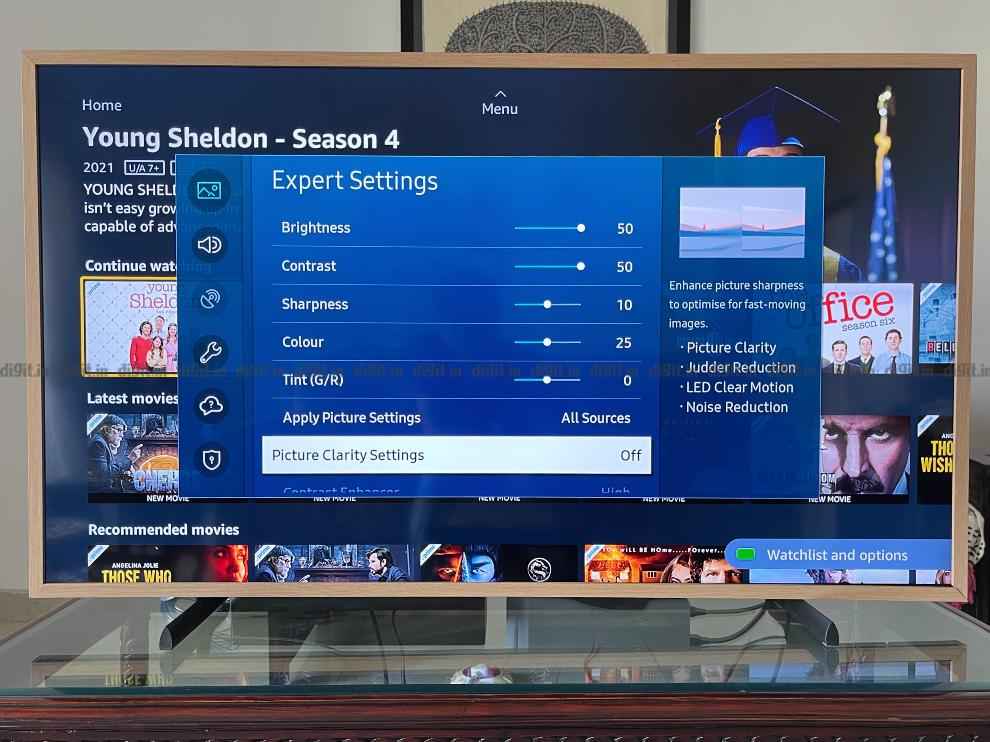
Samsung The Frame: Gaming
This is where things get quite interesting. When you set up the PS5 with this TV and adjust the HDR brightness, it looks like the TV is compensating in some ways for its lower peak brightness by letting you set the brightness of the console much higher than it can handle. This was very evident in a game like Dirt 5 (review) that looked burnt when we played it and we had to change the HDR settings in the game to have an enjoyable experience. Going back into the PS5 settings and changing it based on what I felt was right rather than what was on display yielded better results. While there is a loss of detail in very bright highlights, the picture quality is in no way bad. Once again, you wouldn’t know what to look for as it was only in the extremely bright highlights that there is a loss of detail on this TV.
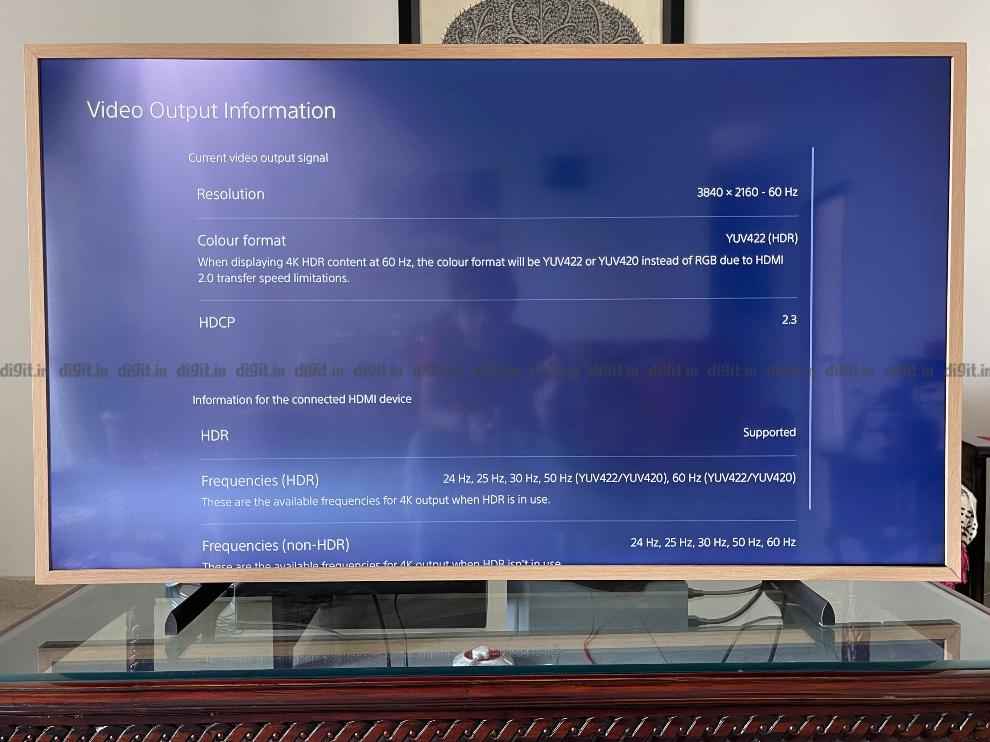
In Spider-Man Miles Morales (review), the sun is raining down on you while you can still make out the details in Spider-Man’s suite is impressive. Colours in games just pop on this TV and even in Ghost of Tsushima, the watercolour colour art style of the game comes to life.
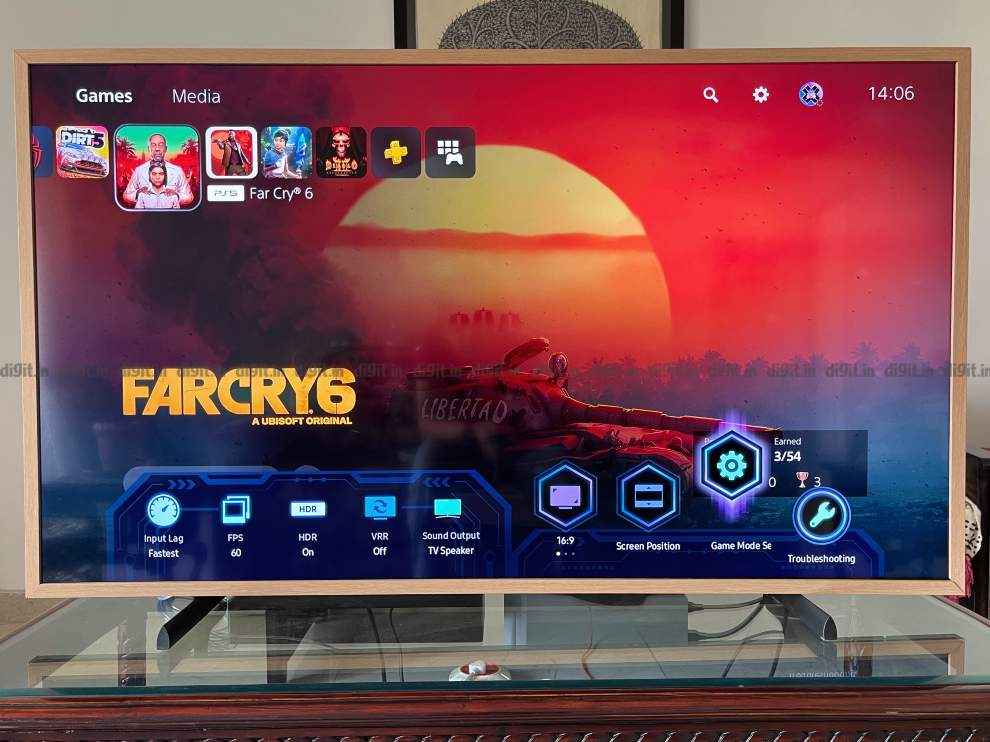
The only downside to the TV’s gaming performance is that to take advantage of the 120Hz panel and some HDMI 2.1 features, you need to invest in the 55-inch or larger variant of this TV. The 50-inch TV is limited to 60Hz. The TV’s game mode supports low latency and from the single-player games we played, we didn’t face any disturbing input lag on the TV.
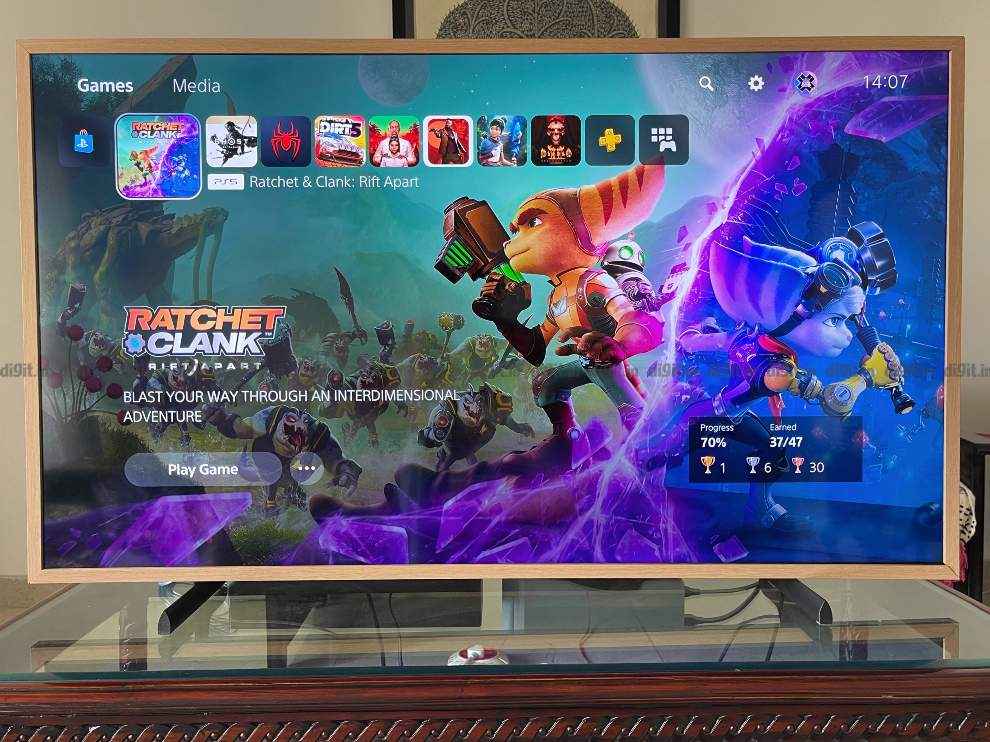
Samsung The Frame: Audio Performance
Samsung’s The Frame 2021 has 20W of sound output for the 43 and 50-inch variant whereas the larger screen sizes have 40W of sound output. Clear is the best way to describe the sound output from the TV. While you will miss the bangs and thuds of an action movie, dialogues are easily audible and the background score of most movies and TV shows sounds fine.
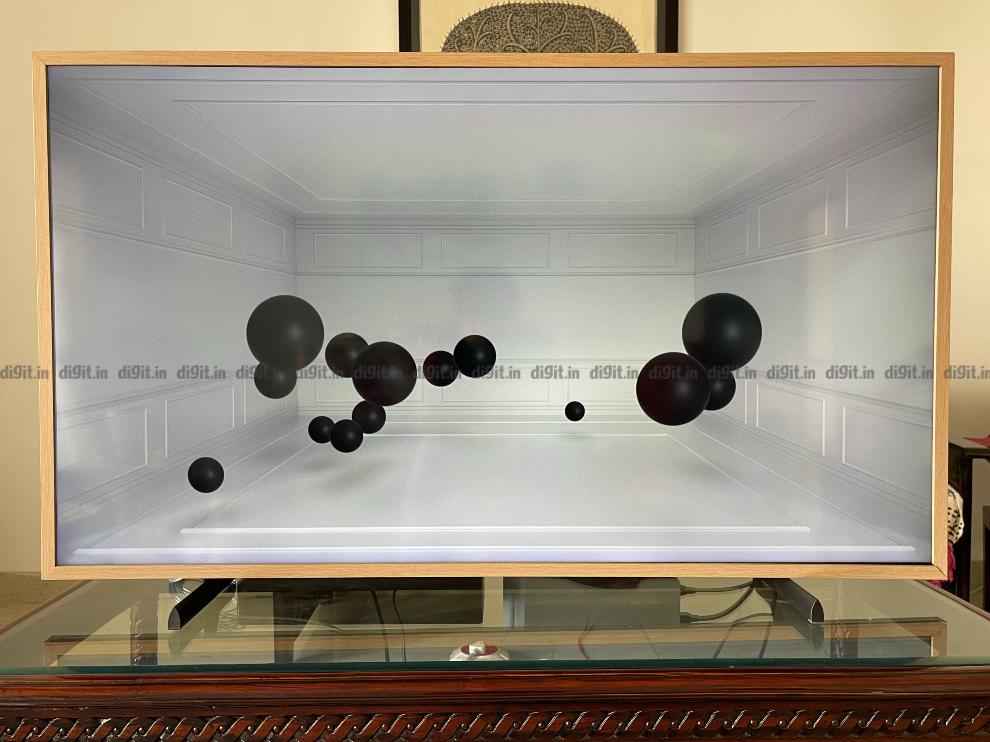
The speakers can get really loud but I found that keeping it at about 40 percent volume gave a loud room-filling sound. There is a loss of detail at very high volumes but for the average bedroom, the performance should be fine. It makes sense to invest in a soundbar with this TV especially considering its eARC port and support for Dolby Atmos.
Samsung The Frame: UI
Samsung’s TVs run on the company’s own Tizen UI and functional is the best way to describe it. Pressing the home buttons brings up all the apps neatly in a row at the bottom of the display and if you have an external device like a PlayStation 5, then that also comes up in the content navigation. You can rearrange the apps and external sources based on your preference making navigation a breeze.
The settings are at the far left of the navigation bar and once you select it, there is a second row of quick settings for you to interact with before delving deep. Even the other settings like picture, external source, audio, and more are easily accessible and no setting feels too buried as the UI is very easy to navigate.
There is also the Art mode and Ambient mode in the TV which is a highlight of the Frame. In Art mode, you can have your family picture or simply pictures from Samsung’s vast catalogue occupying the TV adding to your room decor. The ambient mode has a vast number of settings from changing the background based on the mood to relaxing views of the mountains and even balls bouncing on the screen. You can also have weather information on the screen when the TV is not in use.
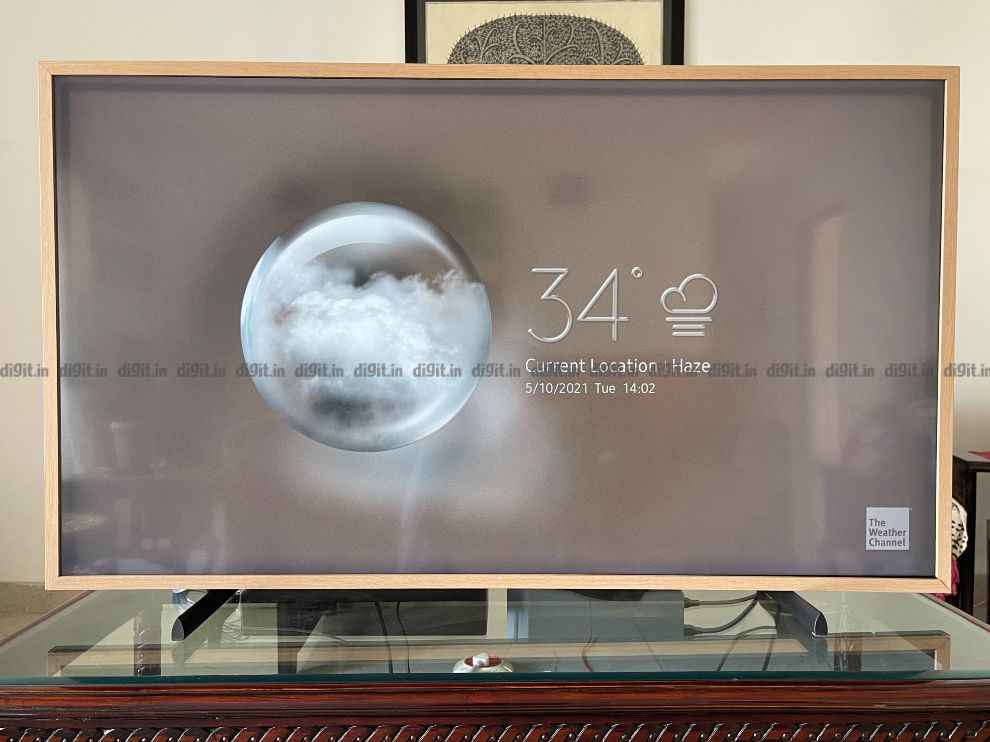
To delve deep into the settings of the TV with ease, I highly recommend you download and set up the smart things app. The app has the usual set of functions letting you switch on/off the TV, control the art and ambient mode on the TV, navigate the apps, control the volume and change the source. Needless to say, if the remote control is out of reach, then the smartphone app is your best friend.
Samsung The Frame: Remote Control
Speaking of the remote control, it has a minimal design. It has a USB-C port at the bottom so no need to change the batteries. You can also leave the remote control under light and let it recharge as it has a small solar panel at the back, which is really cool. Coming to the buttons, the volume rocker and channel changer have a distinct click to them when used and you can simply press the volume button to mute the TV. You have OTT hotkeys for Netflix, Prime Video and Samsung TV Plus. The rest of the navigation is pretty simple and overall, the remote control is easy to use.
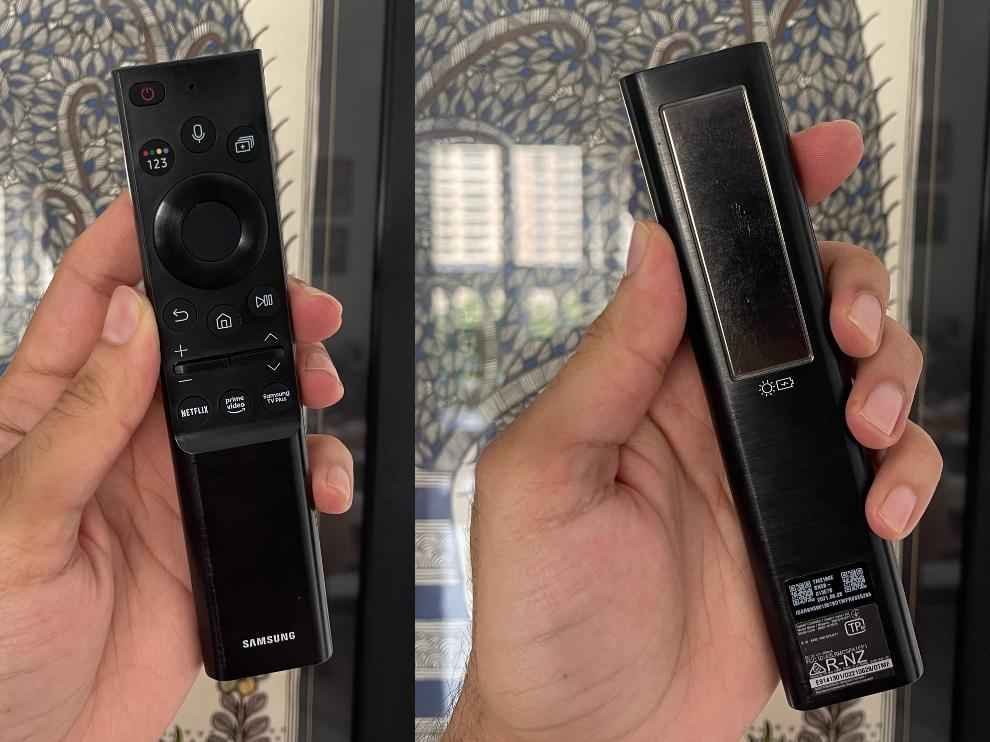
Samsung The Frame: Build and design
Samsung’s One Connect box is the most unique design adding to the convenience of cable management, but the Frame goes beyond that. It has simple black borders which can be customized with different coloured designs to give it a picture frame like feel. We have the light brown one here for review. While it does add to the picture frame appeal of the TV, some might find it distracting especially in an age of nearly bezel-less TVs. Nonetheless, it is a personal preference.
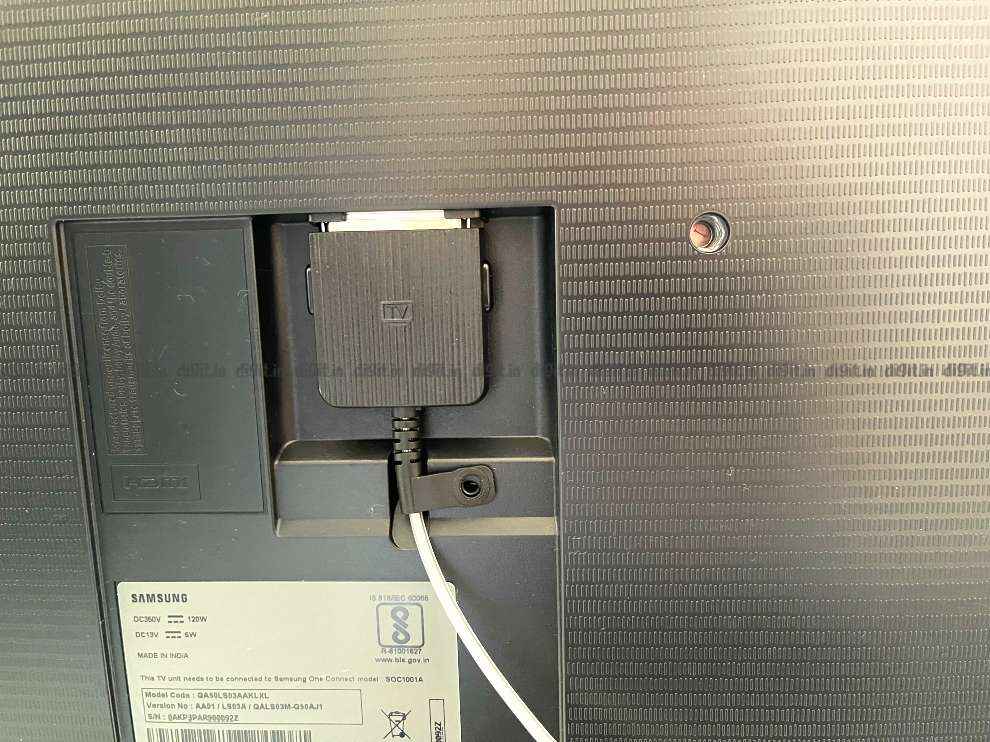
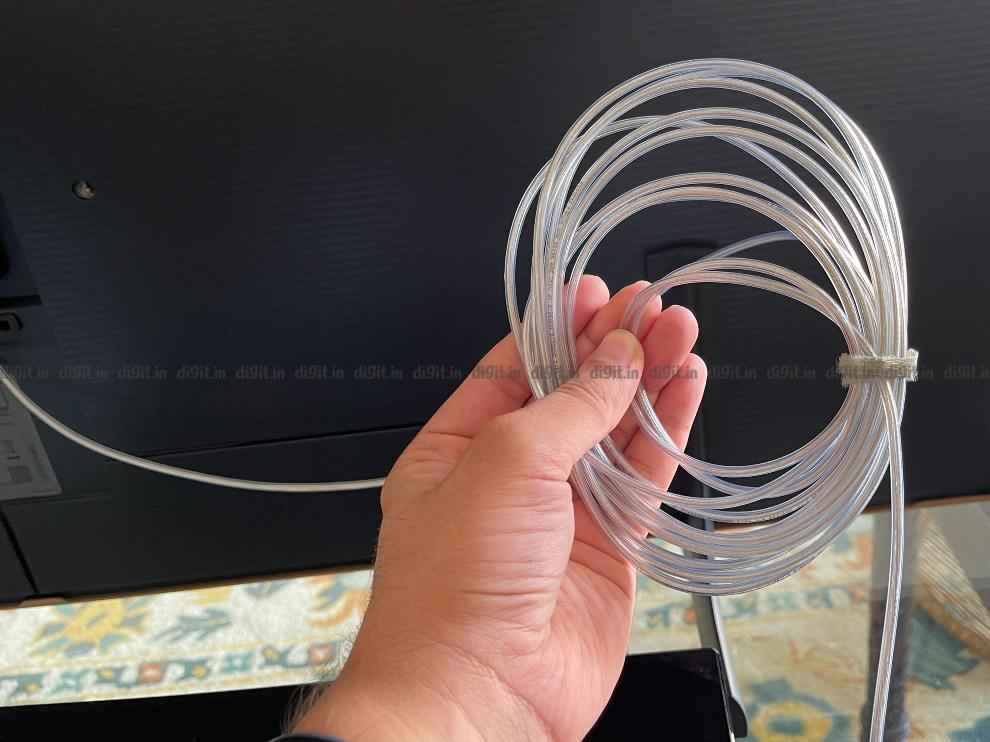
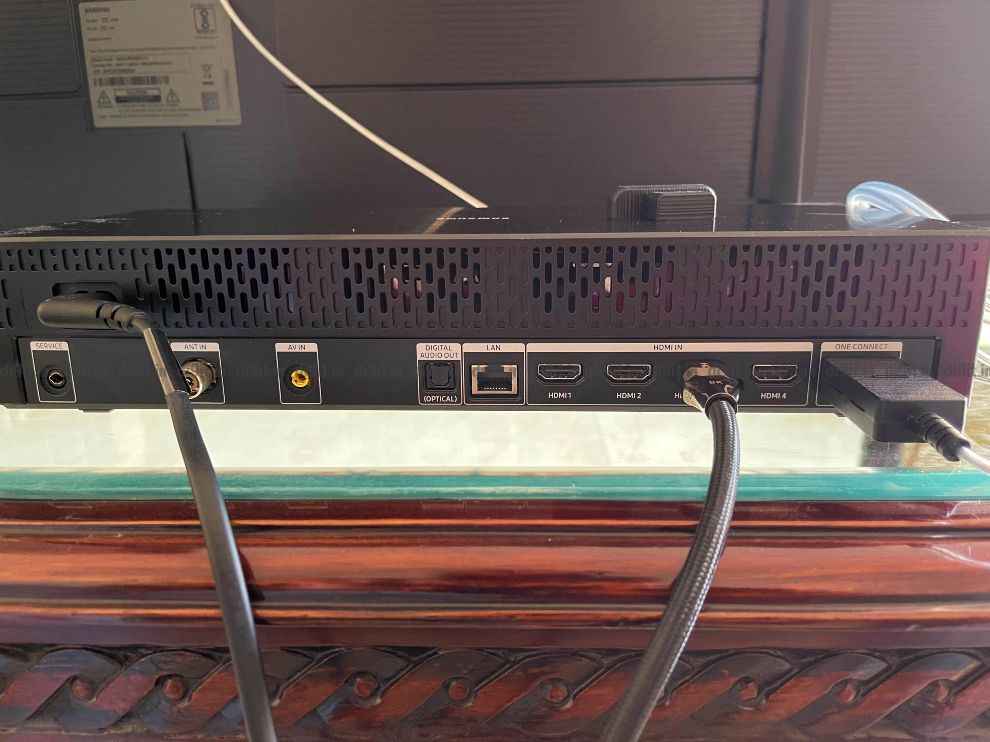
The TV can be wall-mounted and that’s where it would do the most justice to its design, but if you place it on a table-top, it has 2 slim feet that slot in and hold the TV well in place. The feet protrude forward so you might want to check for space in case you plan to place a soundbar below the TV. Then we have the One Connect Box which houses all the connectivity options. It connects to the TV via a single cable that’s almost invisible making the TV the centrepiece of your room without being surrounded by wires. The One Connect Box has four HDMI ports (one of which supports eARC), two USB ports, Optical, AV, and antenna.
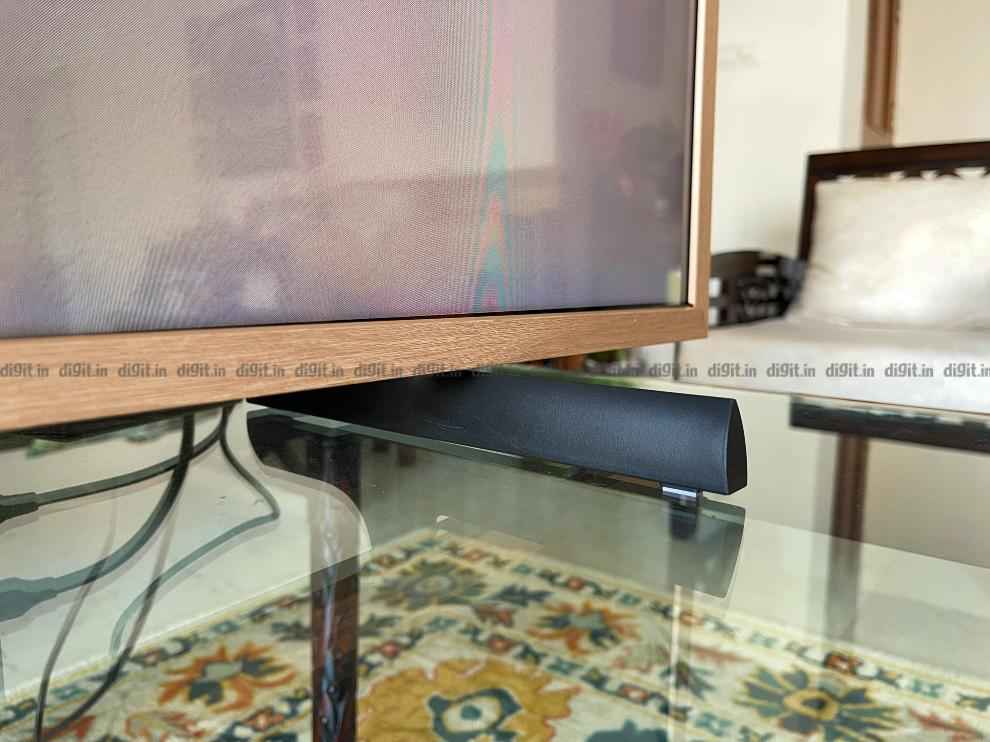
Bottom Line
The 50-inch Samsung The Frame has a unique design that will definitely appeal to those that want their TV to blend into the decor of their room and the One Connect Box makes cable management a breeze. The picture quality of the TV for content consumption is very good for HDR and SDR content and Samsung’s Intelligent Picture Mode is good enough that you don’t need to delve into the picture presets yourself. The UI is smooth and easy to navigate and even for gaming, the TV can make the content pop. While the HDR calibration for the PS5 isn’t ideal natively, it’s nothing that a little tinkering won’t fix making the TV good for gaming. However, those looking to exploit HDMI 2.1 features found on the PS5 and Xbox Series X will have to look at the 55-inch variant or higher as the 50-inch variant lacks a 120Hz display. On the downside, the TV does not support Dolby Vision and it loses out on some bright highlight details because of its lower peak brightness. The sound output through clear is average for mixed content like movies and gaming. If you are in the market to pick up a 50-inch TV around 75 to 80K, you can definitely consider the Frame. The closest competitor we’ve tested is the Sony X80J.
[ad_2]
Source link






